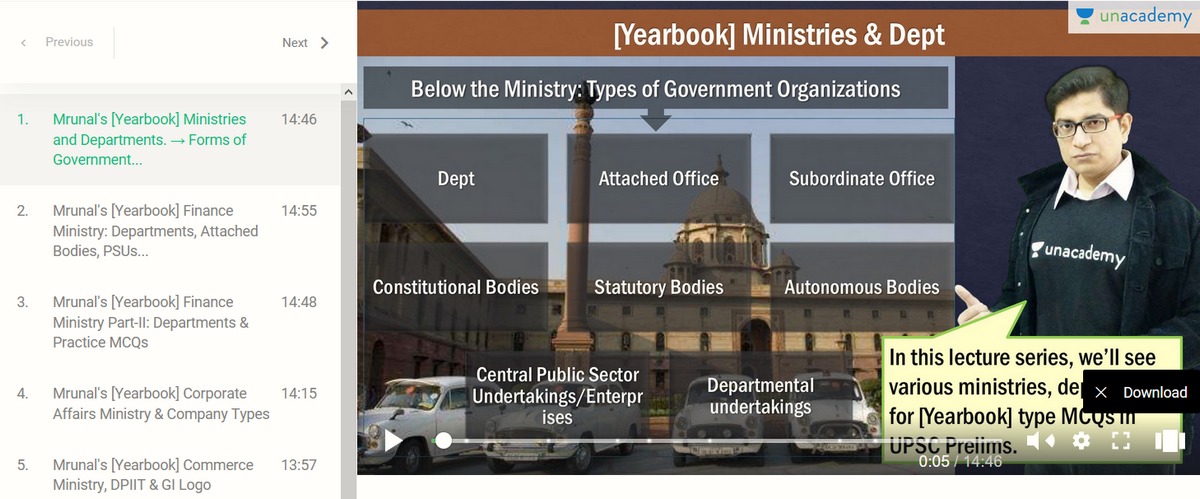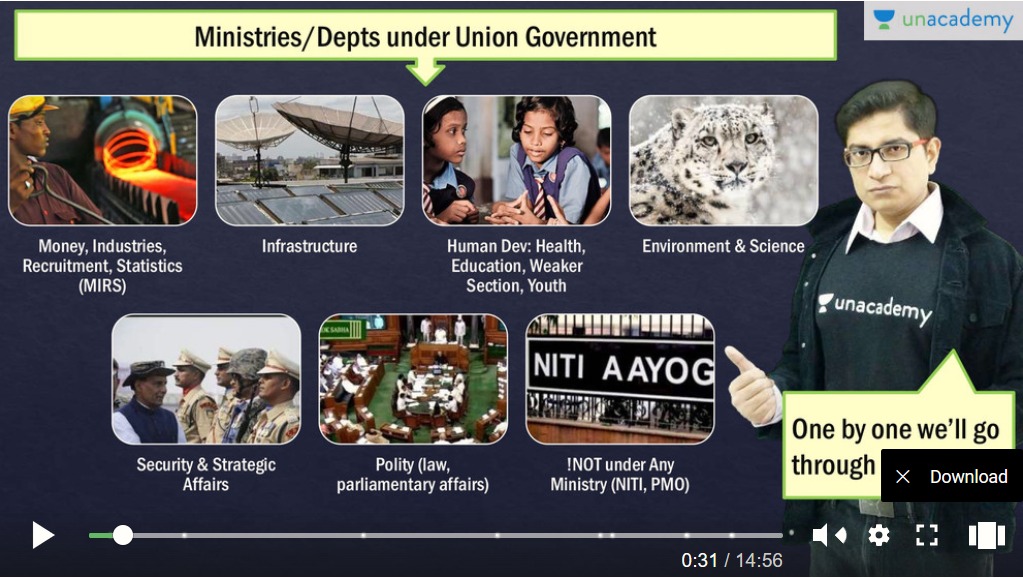Prologue
- In this article series, we’ll see ministries of the Union Government, and their underlying Attached Offices, Subordinate Offices, Constitutional Bodies, Statutory Bodies, Autonomous Bodies, Central Public Sector Undertakings/Enterprises and Departmental undertakings.
- But first let’s understand the meaning of these terms before we look at individual ministries.
Basic Terminologies / Keywords
Ministries & Departments
- Formulate policy, oversee its implementation.
- Their elected head is ‘Minister’, their appointed head is a ‘Secretary’ – usually an IAS. Although, there are exceptions e.g. Ministry of Statistics and Programme Implementation (MOSPI): Its ‘Secretary’ is from Indian Statistical Service (ISS), he is also designated as ‘Chief Statistician of India’.
Attached Offices
- Execute a particular policy, scheme, or work. May also advise the dept on various matters.
- Minister will give them annual budget, and reply to their questions in parliament, but attached offices enjoy freedom in day to day operations.
- g. Health Ministry → National Health Authority (NHA),
- Ministry of Housing & Urban Affairs → Central Public Works Department,
- Jal Shakti Ministry → Central Water Commission.
Subordinate Offices
- They function under the direction of an attached office, or sometimes directly under a department/ministry.
- g. Rail Ministry → Railway Recruitment Board
- Department of Science & Technology → Survey of India.
Constitutional and Statutory Bodies
| Constitutional | – They find mention in the Constitution itself e.g. Union Public Service Commission, Election Commission, Comptroller and Auditor General of India etc. |
| Statutory | – Such bodies as are established under a statute or an Act of Parliament e.g. Central Vigilance Commission, Central Information Commission, Central Board of Film Certification. |
Autonomous Bodies
- Such bodies are usually registered under the Societies Registration Act, and given functional and financial autonomy as per the Memorandum of Associations with the given Ministry.
- They usually have a trustee / governing council headed by the Minister to give overall direction.
- But body is not required to consult Finance Ministry or DoPT for every small matter related to money or recruitment.
- g. HRD Ministry → CBSE, NCERT, National Book Trust, National Testing Agency (NTA: NEET etc.)
- Textile Ministry →1986: (Autonomous) National Institute of Fashion Technology but 2006 separate act so Statutory status.
Departmental undertakings
- They are engaged in commercial activities but directly under control of Ministry/Department.
- Its employees are Government employees e.g. Indian Railways, Indian Post, Ordnance Factories.
Public Sector Undertakings (PSUs)
- Their employees are not considered ‘Govt employees’, their promotion, payscale, discipline rules are different than Govt employees.
- Govt receives part of the profit, as ‘Dividend’ depending on the shareholding pattern.
- They can be classified into following parts:
PSU → Statutory Corporations
- They are set up under individual acts of Parliament e.g. Reserve Bank of India, Food Corporation of India (FCI), LIC and SBI.
PSU → Government Companies
- They’re registered under the Companies Act e.g. Steel Authority of India (SAIL).
- Depending on number of participants, it could be a public ltd company or private ltd company.
- Depending on Government ownership, it could be a public sector company (e.g. Indian Oil Corporation ltd) or ‘private sector’ company (e.g. NSDC skill development corporation)- but then it can’t be called a PSU.
- Depending on profitability, it may have received a ‘Ratna’ status and corresponding autonomy in its functioning.
- Further it may have received license from RBI to operate as a bank → Public Sector Bank. It includes: SCB, RRB and India Post Payment Bank.
Ministries of the Union Government
We can further classify them into following blocks / parts:
Block#1: Related to Money, Industries, Recruitment, Statistics (MIRS)
| Core Economy | Finance Ministry, Corporate Affairs Ministry, Ministry of Commerce and Industry |
| Agro related | Ministry of Agriculture and Farmers Welfare, Food Processing Industries |
| Non-Agro Industries | Textile Ministry, MSME Ministry , Chemicals & Fertilizers Ministry, Steel Ministry, Heavy Industries & Public Enterprises, Ministry of Tourism |
| Recruitment | Ministry of Labour, Ministry of Personnel |
| Statistics | MOSPI: Statistics & Program Implementation, Ministry of Planning |
Block#2: Related to Infrastructure
| Natural Resources | Mines Ministry, Coal Ministry, Ministry of Petroleum and Natural Gas |
| Water | Ministry of Jal Shakti / Water Resources, Ministry of Drinking Water and Sanitation |
| Energy | Ministry of Power, Ministry of New and Renewable Energy |
| Transport | Ministry of Shipping, Ministry of Railways, Ministry of Civil Aviation, Ministry of Housing & Urban Affairs |
| Rural | Ministry of Rural Development, Ministry of Panchayati Raj |
| Communication | Ministry of Communication, Ministry of Electronics & IT (MEITY), Ministry of Information & Broadcasting, |
Block#3: Related to HRD
| Education and Skill | Ministry of Human Resource Development, Ministry of Skill Development & Entrepreneurship |
| Health | Ministry of Health And Family Welfare, Ayush Ministry |
| Weaker Section | Ministry of Minority Affairs, Ministry of Tribal Affairs, Ministry of Social Justice And Empowerment, Ministry of Women & Child Development, Consumer Affairs Ministry |
| Youth and Culture | Ministry of Youth Affairs And Sports, Ministry of Culture |
Block#4: Related to Security & Strategic Affairs
- Ministry of Home
- Ministry of Defense
- Ministry of External Affairs
- Ministry of Development of North-Eastern Region
Block#5: Environment & Science
- Ministry of Earth Sciences
- Ministry of Environment, Forest and Climate Change
- Ministry of Science and Technology
Block#6: Polity
- Ministry of Law and Justice
- Ministry of Parliamentary Affairs
Block#7: Not under any Ministry
Independent Departments
- Department of Atomic Energy (Parmanu Oorja Vibhag)
- Department of Space (Antariksh Vibhag)
Apex/Independent Office
- Cabinet Secretariat (Mantrimandal Sachivalaya)
- President’s Secretariat (Rashtrapati Sachivalaya)
- Prime Minister’s Office (Pradhan Mantri Karyalaya)
- NITI Aayog (National Institution for Transforming India)
From the Next article, we’ll start with the Finance Ministry.



![[Yearbook] Finance Ministry’s Departments, Attached/Subordinate Offices, Statutory/Autonomous Bodies & CPSEs](https://mrunal.org/wp-content/uploads/2019/06/c-IYB-ministries-500x383.gif)
I love your content sir…. Very very helpful
Awesome way of introducing information.